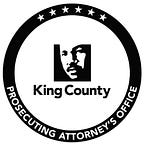Stephanie Knightlinger KCPAO Women in Leadership
This Women’s History Month, the King County Prosecuting Attorney’s Office is highlighting some of the depth and breadth of women leaders in our office as part of our “Women in Leadership” series. These profiles are only a few of the many amazing women in our office.
How long have you worked at the PAO?
I started in 2007 as a Rule 9 intern after my second year of law school. I was hired as a full-time Deputy Prosecuting Attorney (DPA) in 2008.
What is your role in the PAO?
I am Chair of our Felony Trial Unit in the Seattle Courthouse. We are the first felony rotation for most of our DPAs who are usually in their first or second year in our office. We help them learn all the ins and outs of felony prosecution: reviewing and filing of charges, how to handle all of the court calendars that make our superior court function (i.e. arraignment, first appearance, and plea calendars), and how to try a felony case. We handle the non-violent felonies, such as burglaries or car thefts. While these cases are the less serious or non-violent cases, they are very important to our community, the victims of the crimes, and suspects charged. My goal is to teach our DPAs how to perform the job with excellence and how to live our office’s mission to do justice. This may mean pursuing a traditional prosecution or it may mean that we look to resources such as our Drug Diversion Court or Regional Mental Health Court for an alternative solution that may better meet the needs of the defendant, victim and community.
***As of Monday, March 8, Stephanie is transitioning to a new role at the PAO in the Natural Resources Section of the Civil Division. Additionally, the Felony Trial Unit is transitioning to become the General Crimes Unit, and will encompass the Let Everyone Advance with Dignity Program (LEAD — formerly known as the Law Enforcement Assisted Diversion Program), Drug Court, and VITAL/Familiar Faces.
What were you doing before coming to the PAO?
I was in law school immediately before the PAO. Prior to law school, I worked for Congressman Norm Dicks and in the State Legislature. For Norm, I did everything from scheduling, community outreach, constituent work, and driving him all around the district to meetings. It was a great experience to be exposed to important policy issues, particularly surrounding fisheries and natural resources. I initially intended to go into environmental law, but decided to seek a job with the PAO after I had an externship with King County Superior Court Judge John Erlick and watched the trial work by a number of excellent prosecutors in our office.
What are some of your goals in regards to the work you do?
My biggest goal is helping us train and onboard new DPAs to be ready to face anything they might encounter on the job. To learn the culture of office and our filing standards, and to help hire prosecutors with great judgement and professionalism.
What sort of obstacles have you faced in your field? What was it like dealing with those?
In my current role, my biggest obstacle is figuring out how to respond to the COVID-19 pandemic while keeping our prosecutors and community safe. The DPAs in our unit have been physically in court every day covering the essential court hearings that must occur. This meant that we had to immediately pivot to how to do this safely by wearing masks, social distancing and quickly coming up with a process for Zoom or Video Court in some cases. It required us to embrace innovations in our practice that were unheard of 18 months ago. But our DPAs and staff have risen to the challenge. We also our looking to incorporate these innovations into our practice long term to improve access to justice for victims and defendants.
In terms of being a woman in this field, I’ve seen positive change throughout my career and particularly post-#metoo. When I began as a new prosecutor, I definitely had much older male defense attorneys say things to me on the record — call me “dear” for example — in court that they would never say now. I think it’s fair to say most of my male colleagues have probably never experienced that. It doesn’t happen as much now, but it’s certainly was present particularly when I started. Another area that has affected me as a woman and where I have struggled is how to balance children and family. I now have two young children and I think that women often take on the role of primary parent. The more we normalize men and women taking on the primary parent role or caregiving responsibilities then the more we will see real change in this area. I’m lucky enough to have a partner who I can say that I need to go to court so he will have to handle the last minute doctor’s appointment or whatever has come up. We have to balance it and we both take turns in caregiving responsibilities. It was invaluable to me to have women who had done that balancing act as mothers and prosecutors to go to for advice or support.
What advice would you give to other women who are considering a similar career path?
The biggest advice is don’t hold yourself back. It’s OK to think big, and to seek out and cultivate mentors. It’s also entirely fine to take a different path at times and to know that you can do it all, but maybe not all at once (to paraphrase RBG).
###
Catch up with the entire KCPAO Women in Leadership series on our blog at kcprosecutor.medium.com.
